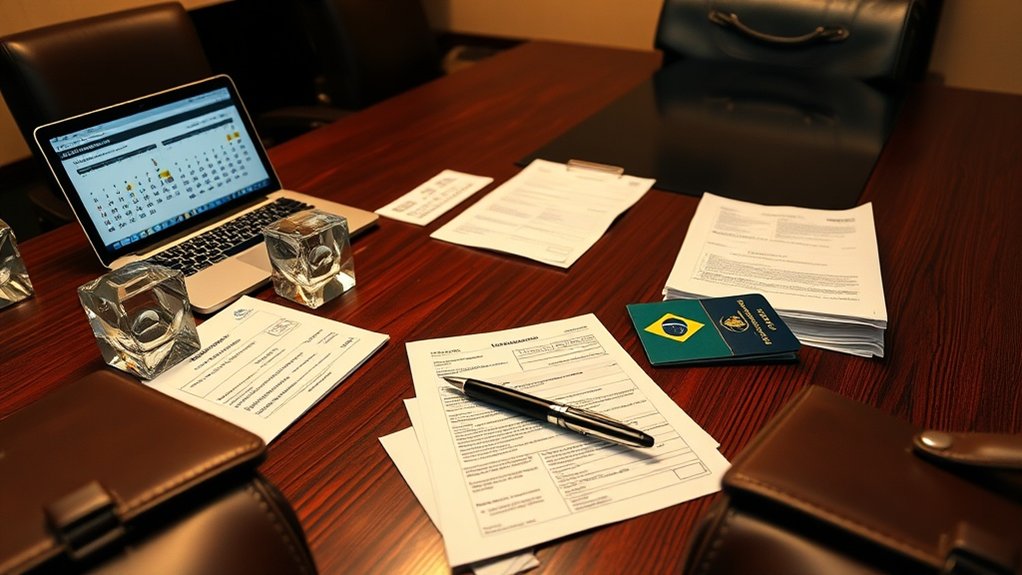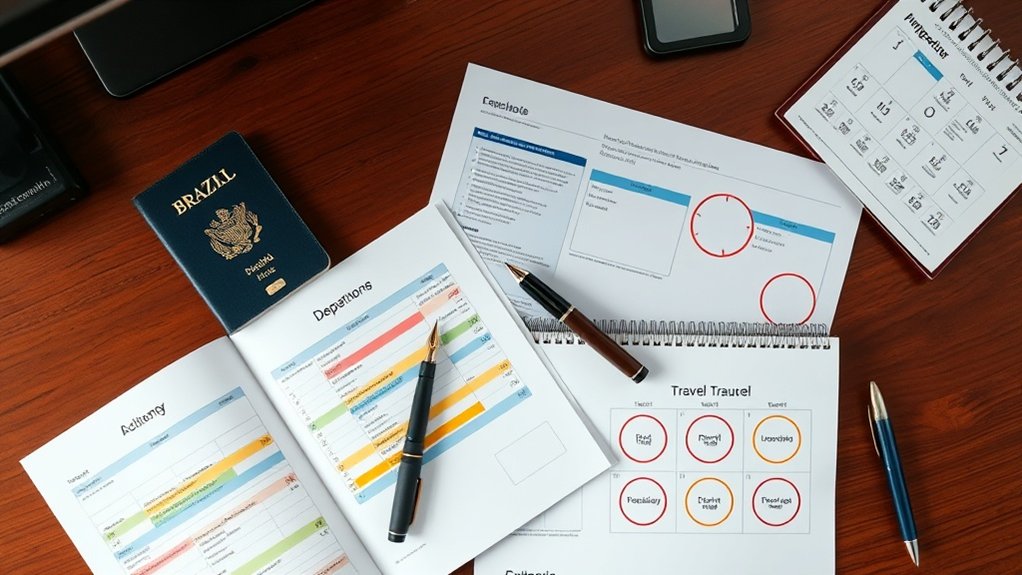You’re planning your next trip to Brazil, but there’s a critical legal requirement that could turn your dream vacation into an expensive nightmare. Foreign nationals must register within 90 days of entry, and missing this deadline triggers substantial penalties that most travelers don’t see coming. The timing of your travel schedule isn’t just about convenience—it’s about staying compliant with Brazilian immigration law and protecting yourself from unexpected fines.
Understanding Brazil’s 90-Day Registration Mandate for Foreign Nationals

When you arrive in Brazil as a foreign national, you’ll encounter a crucial legal requirement that many travelers overlook: the 90-day registration mandate. This federal law requires all foreign visitors to register with the Federal Police within 90 days of entry, regardless of your visa type or intended stay duration.
You must complete this registration at designated Federal Police stations or through authorized online platforms. The process involves submitting your passport, entry stamp, proof of address in Brazil, and completed registration forms. You’ll also need to pay the required fees and provide biometric data.
Failure to comply results in significant penalties, including fines ranging from R$100 to R$10,000, potential deportation, and future entry restrictions. The registration creates your legal record in Brazil’s immigration system, enabling authorities to track your movements and ensuring compliance with visa conditions. Don’t underestimate this requirement’s importance for your legal status.
Successfully completing this registration allows you to obtain your National Migratory Registration Card, which serves as official documentation of your legal presence in Brazil and facilitates access to essential services like banking and public programs.
Common Pitfalls That Lead to Registration Violations and Penalties
Despite the clear legal requirement, countless foreign nationals find themselves facing hefty fines and legal complications due to preventable registration mistakes. You’ll commonly encounter violations when you misunderstand the 90-day timeline, believing it starts from your visa approval rather than your actual entry into Brazil.
Many travelers don’t realize that tourist activities require registration if you’re staying beyond 90 days. You can’t assume your tourist visa exempts you from this mandate. Another frequent mistake involves incomplete documentation—submitting forms without proper translations, missing signatures, or outdated information triggers automatic rejections.
You’ll also face penalties if you register at the wrong Federal Police station. Each jurisdiction has specific requirements, and using an incorrect location delays your process beyond the deadline.
Business travelers often forget that registration applies even for short-term projects extending past 90 days. Don’t overlook weekend and holiday calculations when determining your deadline, as these days count toward your registration timeline. These violations demonstrate why seeking legal guidance early in your stay can prevent severe repercussions including deportation proceedings.
Strategic Travel Schedule Planning to Meet Compliance Deadlines

You’ll need to work backwards from your compliance deadlines when creating your travel itinerary to ensure you’re physically present where registration requirements must be met. Your success depends on identifying the optimal compliance windows and building your schedule around those non-negotiable timeframes. Don’t leave your registration obligations to chance—plan your trips with enough buffer time to handle unexpected delays or last-minute requirement changes. Green Card holders must maintain continuous residency in the U.S. to preserve their permanent resident status and avoid jeopardizing future citizenship eligibility.
Deadline-Driven Itinerary Creation
While traditional vacation planning revolves around leisure preferences, compliance-focused travel demands a fundamentally different approach that prioritizes regulatory deadlines over personal convenience. You’ll need to map critical registration dates first, then build your itinerary backward from those fixed points. Start by identifying the 90-day deadline for each jurisdiction you’re entering. Factor in processing times, potential delays, and required documentation gathering periods. You can’t simply book the cheapest flights or most convenient dates—every travel decision must align with compliance windows. Create buffer periods between destinations to accommodate unexpected delays. Your itinerary becomes a legal framework rather than a leisure schedule, where missing a connection could trigger regulatory violations and substantial penalties. Immigration lawyers can provide essential guidance on these complex timelines and help prevent costly mistakes that could jeopardize your travel plans.
Compliance Window Optimization
Once you’ve established your deadline-driven framework, you must optimize compliance windows by strategically layering registration periods across multiple jurisdictions. You’ll create buffer zones between critical deadlines, ensuring adequate processing time for documentation and unexpected delays. Map out overlapping compliance requirements across different states or countries where you’ll operate, identifying potential conflicts before they become costly mistakes.
You should schedule travel to coincide with optimal filing periods, avoiding peak processing times when government offices experience backlogs. Coordinate your physical presence with signature requirements, notarization needs, and in-person appearances. Build contingency periods into your schedule, allowing flexibility for document corrections or additional requirements. This systematic approach prevents last-minute scrambles and ensures you’re physically positioned to meet each jurisdiction’s specific compliance demands efficiently. When establishing a US business entity, ensure your registered agent is appointed within the required timeframe to handle legal correspondence and maintain good standing across all operating jurisdictions.
Vieira Braga Advogados’ Integrated Approach to Registration Management
Managing travel documentation requires a systematic approach that goes beyond simple paperwork processing. Vieira Braga Advogados has developed an integrated methodology that ensures your registration requirements align perfectly with your travel schedule, eliminating costly oversights and compliance gaps.
Their comprehensive system addresses every aspect of your documentation journey:
- Timeline Coordination: They synchronize your 90-day registration windows with planned travel dates, preventing conflicts before they arise
- Multi-jurisdictional Tracking: Your team monitors requirements across different countries and regions simultaneously
- Automated Alert Systems: You’ll receive timely notifications about upcoming deadlines and renewal requirements
- Documentation Audit Trails: Complete records ensure you can demonstrate compliance during any official review
This integrated approach transforms what’s typically a reactive process into a proactive strategy. You’ll maintain continuous compliance while maximizing your travel flexibility. Rather than scrambling to meet deadlines, you’ll operate with confidence knowing your documentation strategy supports your business objectives seamlessly. Their specialized guidance ensures compliance with both Brazilian and international regulations, preventing the legal risks that arise from missed deadlines and documentation errors.
Timing Your Entry and Exit Points for Maximum Legal Protection

Strategic entry and exit timing forms the cornerstone of legal protection in international travel compliance. You’ll maximize your protection by coordinating your movements with registration deadlines rather than treating them as separate obligations.
You should plan your entry dates to allow sufficient processing time before the 90-day registration window closes. Arriving on day 85 of a registration period creates unnecessary pressure and potential violations. Instead, time your arrival to coincide with the opening of new registration periods.
Your exit strategy requires equal precision. Departing just before registration expires doesn’t reset your compliance status if you haven’t properly completed required procedures. You need buffer time between completing registration requirements and your departure date.
Vieira Braga Advogados maps these critical timeframes for each client, ensuring your travel schedule aligns with legal requirements. This proactive timing prevents last-minute scrambles that often result in incomplete documentation and regulatory gaps.
Improper processing of immigration requirements can expose you to serious legal repercussions including fines, deportation, and barriers to obtaining future documents.
Documentation Requirements That Support Seamless Registration Process
Since registration authorities process thousands of applications daily, having your documentation properly organized and complete determines whether you’ll experience a smooth approval or face costly delays. You can’t afford to submit incomplete paperwork when your legal status depends on timely registration.
Your documentation package must include these essential components:
- Valid passport with sufficient blank pages – Ensure at least six months validity remaining and multiple empty visa pages for stamps
- Proof of financial resources – Bank statements, employment contracts, or sponsorship letters demonstrating adequate funds for your stay
- Accommodation verification – Hotel reservations, rental agreements, or invitation letters with complete address details
- Travel insurance documentation – Coverage meeting minimum requirements with clear policy dates matching your intended stay
Vieira Braga Advogados recommends organizing these documents in both physical and digital formats. Keep originals separate from copies, and maintain backup files accessible from multiple devices to prevent registration delays. Simple mistakes in documentation preparation can result in application denials or unnecessary delays that may affect your personal and professional plans in Brazil.
Penalty Structure and Financial Consequences of Non-Compliance

While proper documentation prevents most registration issues, failing to comply with registration requirements triggers a cascading series of financial penalties that can quickly escalate beyond the cost of your entire trip. Initial fines typically start at $500-1,500 for late registration, but they’re just the beginning of your financial exposure.
You’ll face additional penalties if authorities discover non-compliance during routine checks or border crossings. These secondary fines can reach $2,500-5,000 per violation. Extended non-compliance periods compound the problem, with daily accumulating penalties of $50-200 until you achieve full compliance.
Beyond immediate fines, you’ll encounter indirect costs that often exceed the penalties themselves. These include legal fees, expedited processing charges, accommodation extensions while resolving issues, and potential travel restrictions affecting future trips.
The 90-day registration window isn’t arbitrary—it’s designed to prevent these financial consequences. Vieira Braga Advogados structures travel plans specifically to avoid these penalty cascades, ensuring compliance protects both your current journey and future travel capabilities.
Given the complexity of these cascading penalties, obtaining specialized legal assistance early in the process provides crucial protection against costly mistakes that could significantly exceed the initial investment in professional guidance.
Creating Buffer Zones in Travel Itineraries for Registration Safety
You’ll need strategic departure date planning to ensure you’re not scrambling to meet registration deadlines while abroad. Build emergency extension time allowances into your schedule since unexpected delays can derail even the most carefully planned trips. Don’t forget to account for documentation processing buffer periods, as paperwork often takes longer than anticipated in foreign jurisdictions. Working with experienced attorneys who understand these timing complexities can help you avoid costly mistakes that lead to financial penalties or legal complications.
Strategic Departure Date Planning
Although travel registration deadlines might seem straightforward, they’re often more complex than they appear on the surface. You’ll need to factor in processing delays, documentation requirements, and potential system outages that could derail your compliance timeline.
When planning your departure dates, you should build in substantial safety margins:
- Schedule departures 7-10 days after registration deadlines to accommodate unexpected delays
- Avoid booking travel during holiday periods when government offices operate on reduced schedules
- Plan registration submissions 2-3 weeks before required deadlines to allow for document corrections
- Coordinate with legal counsel early to identify jurisdiction-specific timing requirements
Strategic timing protects you from costly fines and ensures your travel proceeds without legal complications. Smart departure planning eliminates last-minute registration scrambles.
Emergency Extension Time Allowances
Even with careful strategic planning, unexpected circumstances can force you to extend your travel timeline beyond original registration requirements. Medical emergencies, flight cancellations, or sudden work obligations don’t wait for your registration calendar. That’s why you’ll need emergency extension protocols in place before you travel.
Build 10-15 day buffer zones into every travel itinerary. These cushions allow you to handle unexpected delays without triggering registration violations or penalties. If you’re approaching your 90-day limit and can’t return as planned, immediately contact qualified legal counsel who understands local registration laws.
Some jurisdictions offer emergency extensions for documented circumstances like hospitalization or natural disasters. Others don’t. You can’t assume goodwill exists everywhere. Know your options beforehand, maintain proper documentation, and never let circumstances push you past legal deadlines without professional guidance.
Documentation Processing Buffer Periods
When documentation delays threaten your travel timeline, processing buffer periods become your most reliable safety net. You’ll need strategic padding between your arrival date and registration deadline to accommodate unexpected slowdowns in bureaucratic processes.
Smart travelers build these essential buffers into their itineraries:
- Administrative delays buffer – Allow 7-10 extra days for government office backlogs and appointment scheduling conflicts
- Document verification period – Reserve 3-5 days for authentication, translation, and apostille processing requirements
- Correction window – Maintain 2-3 days for addressing errors, missing signatures, or incomplete paperwork submissions
- Weekend/holiday cushion – Account for non-working days that extend processing timelines unexpectedly
These calculated buffers prevent last-minute scrambles and ensure you’ll complete registration requirements comfortably within your 90-day window, avoiding costly penalties.
Multi-Entry Strategy Development for Frequent Brazil Travelers
Three key factors determine your success as a frequent Brazil traveler: timing your applications strategically, maintaining consistent documentation, and building a strong travel history with Brazilian immigration authorities. You’ll need to space your visa applications appropriately, avoiding rushed submissions that signal desperation or poor planning. Document consistency across all applications creates credibility—ensure your employment letters, bank statements, and travel itineraries align perfectly with your stated purposes.
Building rapport with Brazilian consulates requires demonstrating genuine business relationships or tourist interests. Submit compelling invitation letters from established Brazilian partners and provide detailed itineraries showing legitimate activities. Track your entry and exit dates meticulously to avoid overstays that’ll damage future applications.
Consider applying for longer validity periods when available, reducing application frequency while maintaining regular travel patterns. Professional legal guidance from firms like Vieira Braga Advogados helps navigate complex multi-entry requirements, ensuring your strategy aligns with Brazilian immigration expectations and regulatory changes.
Maintaining Ongoing Compliance Through Professional Legal Monitoring

You’ll need automated compliance tracking systems to monitor your legal status continuously without manual oversight gaps. Regular legal status updates ensure you’re informed of any changes to Brazilian immigration requirements that could affect your travel eligibility. Proactive violation prevention strategies help you identify and address potential compliance issues before they escalate into serious legal problems.
Automated Compliance Tracking Systems
Although manual compliance tracking can work for occasional travelers, automated systems become essential as your travel frequency increases or regulations grow more complex. These systems monitor deadlines, track your movements, and alert you to upcoming requirements before violations occur.
Modern automated compliance platforms offer several key advantages:
- Real-time monitoring that tracks your location and calculates remaining days within registration periods
- Automated alerts sent via email or SMS before deadlines approach, preventing last-minute scrambles
- Document management that stores and organizes all registration certificates, receipts, and renewal dates
- Multi-jurisdiction tracking for travelers moving between different states or countries with varying requirements
You’ll reduce stress while maintaining perfect compliance records, allowing you to focus on your business objectives rather than administrative burdens.
Regular Legal Status Updates
While automated systems excel at tracking deadlines and movements, they can’t interpret changing laws or assess how new regulations affect your specific situation. You need human expertise to navigate Brazil’s evolving immigration landscape. Vieira Braga Advogados provides regular legal status updates that go beyond basic deadline reminders.
Their attorneys monitor legislative changes, court decisions, and regulatory updates that could impact your 90-day registration requirements. They’ll alert you when new policies create opportunities for extended stays or when stricter enforcement measures require adjusted travel plans. This proactive approach prevents you from unknowingly violating updated regulations.
You’ll receive personalized assessments of how legal changes affect your specific visa category, travel frequency, and business activities. This ongoing legal monitoring ensures your travel plans remain compliant with current requirements, not outdated information.
Proactive Violation Prevention Strategies
Before violations occur, experienced immigration attorneys implement comprehensive monitoring systems that track your compliance status across multiple entry points and registration periods. You’ll receive automated alerts before deadlines approach, ensuring you’re never caught off-guard by registration requirements.
Professional legal teams establish multi-layered protection through:
- Calendar integration systems that sync registration deadlines with your travel schedule
- Document verification protocols confirming all paperwork remains current and accessible
- Pre-travel compliance audits identifying potential issues before departure
- Emergency response procedures providing immediate support if unexpected situations arise
These proactive measures eliminate guesswork from your compliance strategy. You’ll maintain continuous legal status while focusing on your travel objectives. Rather than reacting to problems, you’ll prevent them entirely through systematic oversight that adapts to changing immigration requirements and personal circumstances.
Frequently Asked Questions
How do you arrange travel arrangements?
Travel arrangements are organized by booking transportation, accommodation, and preparing necessary documents like passports, visas, and insurance.
What are the 5 stages of travel planning?
They include dreaming, planning, booking, experiencing, and sharing the trip.
What are travel plans called?
They are commonly referred to as itineraries or travel itineraries.
How to set a travel plan?
Define your destination, budget, transportation, lodging, and daily activities, then organize them in a clear schedule.
Can Emergency Medical Situations Exempt Travelers From the 90-Day Registration Requirement?
You can’t automatically assume emergency medical situations will exempt you from the 90-day registration requirement. While authorities may show understanding for genuine medical emergencies, you’ll still need to provide proper documentation and explanations. Don’t rely on emergencies as exemptions – you should contact immigration officials immediately if medical issues prevent your compliance. They’ll evaluate your specific circumstances and determine if any flexibility applies to your situation.
How Does Dual Citizenship Status Affect Brazil’s Registration Compliance Obligations?
You’re generally exempt from Brazil’s 90-day registration requirement if you hold Brazilian citizenship, regardless of your other nationality. Dual citizens can enter using their Brazilian passport and aren’t subject to tourist visa limitations or registration deadlines. However, you must consistently use your Brazilian documentation when entering and exiting the country. If you enter on a foreign passport, you’ll face the standard registration obligations like any other international visitor.
Are There Specific Registration Exemptions for Diplomatic or Government Officials?
You’ll find that diplomatic personnel, consular officers, and certain government officials typically receive exemptions from Brazil’s standard registration requirements. If you’re traveling on a diplomatic or official passport, you’re generally exempt from the 90-day registration rule. However, you should verify your specific exemption status with Brazilian authorities, as requirements can vary based on your exact diplomatic status and the nature of your official duties.
What Happens if Registration Deadlines Fall on Brazilian National Holidays?
When your registration deadline falls on a Brazilian national holiday, you’ll typically receive an automatic extension to the next business day. Brazil’s administrative system recognizes that government offices close during national holidays, so you can’t complete required registrations. You should still prepare your documentation in advance and submit it as soon as offices reopen. Don’t wait until the last minute, as this extension only applies to official holidays, not weekends or local observances.
Can Minors Traveling Alone Follow Different Registration Procedures Than Adults?
You’ll find that minors traveling alone don’t follow different registration procedures than adults. They’re subject to the same 90-day registration requirements and deadlines. However, you’ll need additional documentation like parental consent forms and authorized guardian information. You can’t register independently if you’re under 18 – a legal representative must handle the process for you, but the core registration timeline remains identical.
Conclusion
You can’t afford to navigate Brazil’s 90-day registration requirements alone. By partnering with Vieira Braga Advogados, you’ll eliminate costly compliance gaps through strategic travel planning and automated monitoring systems. Their backward-scheduling approach ensures you’re always ahead of deadlines, while built-in buffer zones protect against unexpected delays. Don’t risk penalties that could’ve been prevented—invest in professional legal guidance that transforms complex regulations into seamless travel experiences.






